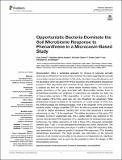| dc.contributor.author | Storey, Sean | |
| dc.contributor.author | Ashaari, Mardiana Mohd | |
| dc.contributor.author | Clipson, Nicholas | |
| dc.contributor.author | Doyle, Evelyn | |
| dc.contributor.author | de Menezes, Alexandre B. | |
| dc.date.accessioned | 2020-01-21T10:45:35Z | |
| dc.date.available | 2020-01-21T10:45:35Z | |
| dc.date.issued | 2018-11-21 | |
| dc.identifier.citation | Storey, Sean, Ashaari, Mardiana Mohd, Clipson, Nicholas, Doyle, Evelyn, & de Menezes, Alexandre B. (2018). Opportunistic Bacteria Dominate the Soil Microbiome Response to Phenanthrene in a Microcosm-Based Study. Frontiers in Microbiology, 9(2815). doi: 10.3389/fmicb.2018.02815 | en_IE |
| dc.identifier.issn | 1664-302X | |
| dc.identifier.uri | http://hdl.handle.net/10379/15716 | |
| dc.description.abstract | Bioremediation offers a sustainable approach for removal of polycyclic aromatic hydrocarbons (PAHs) from the environment; however, information regarding the microbial communities involved remains limited. In this study, microbial community dynamics and the abundance of the key gene (PAH-RHDa) encoding a ring hydroxylating dioxygenase involved in PAH degradation were examined during degradation of phenanthrene in a podzolic soil from the site of a former timber treatment facility. The 10,000-fold greater abundance of this gene associated with Gram-positive bacteria found in phenanthrene-amended soil compared to unamended soil indicated the likely role of Gram-positive bacteria in PAH degradation. In contrast, the abundance of the Gram-negative PAHs-RHDa gene was very low throughout the experiment. While phenanthrene induced increases in the abundance of a small number of OTUs from the Actinomycetales and Sphingomonadale, most of the remainder of the community remained stable. A single unclassified OTU from the Micrococcaceae family increased similar to 20-fold in relative abundance, reaching 32% of the total sequences in amended microcosms on day 7 of the experiment. The relative abundance of this same OTU increased 4.5-fold in unamended soils, and a similar pattern was observed for the second most abundant PAH-responsive OTU, classified into the Sphingomonas genus. Furthermore, the relative abundance of both of these OTUs decreased substantially between days 7 and 17 in the phenanthrene-amended and control microcosms. This suggests that their opportunistic phenotype, in addition to likely PAH-degrading ability, was determinant in the vigorous growth of dominant PAH-responsive OTUs following phenanthrene amendment. This study provides new information on the temporal response of soil microbial communities to the presence and degradation of a significant environmental pollutant, and as such has the potential to inform the design of PAH bioremediation protocols. | en_IE |
| dc.description.sponsorship | This work was funded under the Irish Environmental Protection Agency STRIVE programme 2007–2013 (grant no. 2008-PhD-WRM-1), the Ireland-Wales Programme 2007-2013 (GIFT project), and the SLAB scholarship programme of the Malaysian Ministry of Higher Education and the International Islamic University, Malaysia. | en_IE |
| dc.format | application/pdf | en_IE |
| dc.language.iso | en | en_IE |
| dc.publisher | Frontiers Media | en_IE |
| dc.relation.ispartof | Frontiers In Microbiology | en |
| dc.rights | Attribution-NonCommercial-NoDerivs 3.0 Ireland | |
| dc.rights.uri | https://creativecommons.org/licenses/by-nc-nd/3.0/ie/ | |
| dc.subject | polycyclic aromatic hydrocarbons | en_IE |
| dc.subject | mierobiome | en_IE |
| dc.subject | bioremediation | en_IE |
| dc.subject | soil | en_IE |
| dc.subject | phenanthrene | en_IE |
| dc.subject | POLYCYCLIC AROMATIC-HYDROCARBONS | en_IE |
| dc.subject | 16S RIBOSOMAL-RNA | en_IE |
| dc.subject | COMMUNITY STRUCTURE | en_IE |
| dc.subject | ORGANIC POLLUTANTS | en_IE |
| dc.subject | CONTAMINATED SOIL | en_IE |
| dc.subject | PAH DEGRADATION | en_IE |
| dc.subject | LONG-TERM | en_IE |
| dc.subject | DIVERSITY | en_IE |
| dc.subject | BIOREMEDIATION | en_IE |
| dc.subject | DYNAMICS | en_IE |
| dc.title | Opportunistic bacteria dominate the soil microbiome response to phenanthrene in a microcosm-based study | en_IE |
| dc.type | Article | en_IE |
| dc.date.updated | 2020-01-21T09:34:14Z | |
| dc.identifier.doi | 10.3389/fmicb.2018.02815 | |
| dc.local.publishedsource | https://doi.org/10.3389/fmicb.2018.02815 | en_IE |
| dc.description.peer-reviewed | peer-reviewed | |
| dc.contributor.funder | Environmental Protection Agency, Ireland | en_IE |
| dc.contributor.funder | Malaysian Ministry of Higher Education | en_IE |
| dc.contributor.funder | International Islamic University Malaysia | en_IE |
| dc.internal.rssid | 15448650 | |
| dc.local.contact | Alexandre De Menezes, Room Es106, Microbiology, Arts And Science Building, School Of Natural Sciences, Ryan Institute. - Email: alexandre.demenezes@nuigalway.ie | |
| dc.local.copyrightchecked | Yes | |
| dc.local.version | ACCEPTED | |
| nui.item.downloads | 209 | |


